Search
for
Sort by
Research
30 / 1000+ results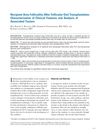
research Recipient Area Folliculitis After Follicular-Unit Transplantation: Characterization of Clinical Features and Analysis of Associated Factors
Postoperative folliculitis after hair transplants is a minor issue that doesn't relate to patient details or how much hair is transplanted.

research Comparative Studies of Hair Shaft Components Between Healthy and Diseased Donors
Hair analysis can help identify specific minerals and amino acids linked to various diseases.
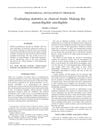
research Evaluating Statistics in Clinical Trials: Making the Unintelligible Intelligible
Doctors need to understand statistics to properly evaluate clinical trials for patient care.
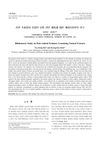
research Bibliometric Study on Hair-Related Products Containing Natural Extracts
More research is needed on natural hair products, especially clinical studies.

research Hair Growth Promoting Activity of Cedrol Isolated from the Leaves of Platycladus Orientalis
Cedrol from Platycladus orientalis leaves may promote hair growth effectively, especially in female mice.

research Association of Estrogen Receptor Gene Variants (ESR1 and ESR2) with Polycystic Ovary Syndrome in Tunisia
Certain gene variants in estrogen receptors are linked to polycystic ovary syndrome, mainly affecting metabolism, in Tunisian women.

research The Mediation Role of Sleep on the Relationship Between Drinks Behavior and Female Androgenetic Alopecia
Sleep may mediate the link between sugary drinks and female hair loss.

research Hierarchically Assembled Nanofiber Scaffolds With Dual Growth Factor Gradients Promote Skin Wound Healing Through Rapid Cell Recruitment
The new scaffold with two growth factors speeds up skin healing and reduces scarring.

research Keratinocytes of the Upper Epidermis and Isthmus of Hair Follicles Express Hemoglobin mRNA and Protein
Skin cells and certain hair follicle areas produce hemoglobin, which may help protect against oxidative stress like UV damage.

research Development of Modified Montmorillonite-Bacterial Cellulose Nanocomposites as a Novel Substitute for Burn Skin and Tissue Regeneration
New nanocomposites with copper show promise for healing burn wounds and regenerating skin.

research Faculty Opinions Recommendation of Platelet-Rich Plasma and Its Utilities in Alopecia: A Systematic Review
PRP is mostly effective and safe for treating certain types of hair loss, but more research is needed on the best use methods.

research Efficacy and Safety of Finasteride Therapy for Androgenetic Alopecia
Finasteride helps improve hair growth in men with hair loss but may increase the risk of erectile dysfunction.
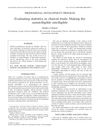
research Select the Most Correct Answers – Multiple Answers Possible for Questions 1–11
Medical practitioners need to understand basic statistics to properly evaluate clinical trials and avoid unethical designs.

research Very-Low-Dose Oral Minoxidil in Male Androgenetic Alopecia: A Study with Quantitative Trichoscopic Documentation
Low-dose oral minoxidil improved or stabilized hair loss in some patients, but higher doses may be needed for significant effects.
research Dietary Habits and Their Impact on Physical Symptoms Severity in Young Females Diagnosed with PCOS
Poor diets worsen PCOS symptoms in young women.
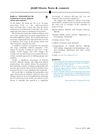
research Reply to: Tofacitinib for the Treatment of Severe Alopecia Areata and Variants
More extensive trials are needed to understand tofacitinib's role in treating severe hair loss.

research Why Odds Ratios Can Be Tricky Statistics
Odds Ratios can be misleading; it's better to also present risk and Relative Risks for clarity.

research Comparative Morphological Characterization of Skin after Subcutaneous Application of Hyaluronic Acid and Polycaprolactone in Rats: Establishment of an Experimental Model
Hyaluronic acid and polycaprolactone improve skin regeneration, with polycaprolactone having a stronger effect on healing and tissue repair.

research Paradoxical Hypertrichosis After Laser Epilation
Very few people experience increased hair growth after laser hair removal, especially those with darker skin and black hair.

research Ultrasonic-Assisted Extraction and In-Vitro Antioxidant Activity of Polysaccharide from Hibiscus Leaf
The study found an efficient method to extract antioxidants from Hibiscus leaves.

research AGD1, A Class 1 ARF-GAP, Acts in Common Signaling Pathways with Phosphoinositide Metabolism and the Actin Cytoskeleton in Controlling Arabidopsis Root Hair Polarity
AGD1 is important for root hair development in Arabidopsis, working with phosphoinositide signaling and the actin cytoskeleton.

research Hair Regenerative Mechanisms of Red Ginseng Oil and Its Major Components in the Testosterone-Induced Delay of Anagen Entry in C57BL/6 Mice
Red ginseng oil and its components help promote hair regrowth and could treat hair loss.

research Regulatory T Cells Are Required for Normal and Activin-Promoted Wound Repair in Mice
Regulatory T cells are essential for normal and improved wound healing in mice.

research Lack of Response of Alopecia Areata to Pimecrolimus Cream
Pimecrolimus cream is not effective for treating alopecia areata.

research Electron Paramagnetic Resonance Spectroscopy for Investigating Murine Telogen Skin After Spontaneous or Depilation-Induced Hair Growth
EPR spectroscopy showed that spontaneous hair growth results in thicker skin and less pigmented hair than depilation-induced growth.

research Hair Growth Promoting Activity of Cedrol Nanoemulsion in C57BL/6 Mice and Its Bioavailability
Cedrol Nanoemulsion was found to be more effective at promoting hair growth than traditional treatments and had better bioavailability.

research Impact of Substrate Stiffness on Dermal Papilla Aggregates in Microgels
Softer hydrogel surfaces help maintain hair growth-related functions in skin cells.

research Evaluation of the Relationship Between Androgenetic Alopecia and Demodex Infestation
There's no significant relationship between hair loss (androgenetic alopecia) and demodex infestation.
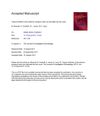
research Topical Inhibition of the Electron Transport Chain Can Stimulate the Hair Cycle
Applying certain inhibitors to the skin can promote hair growth without harming cells.